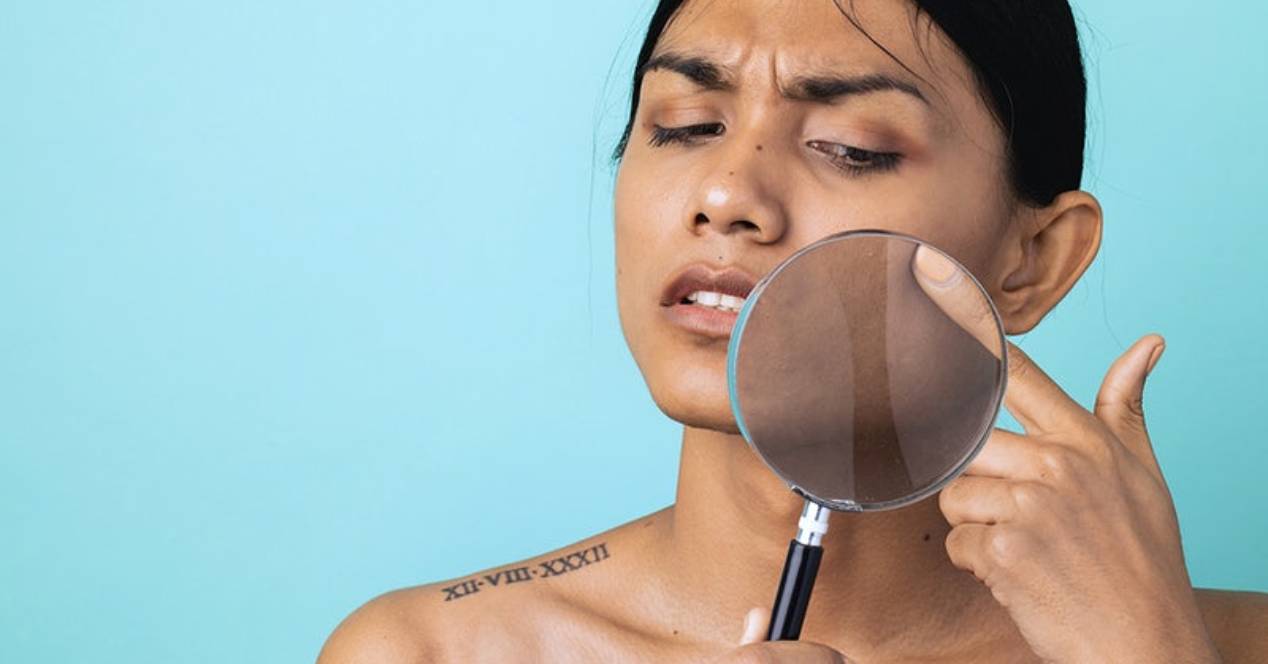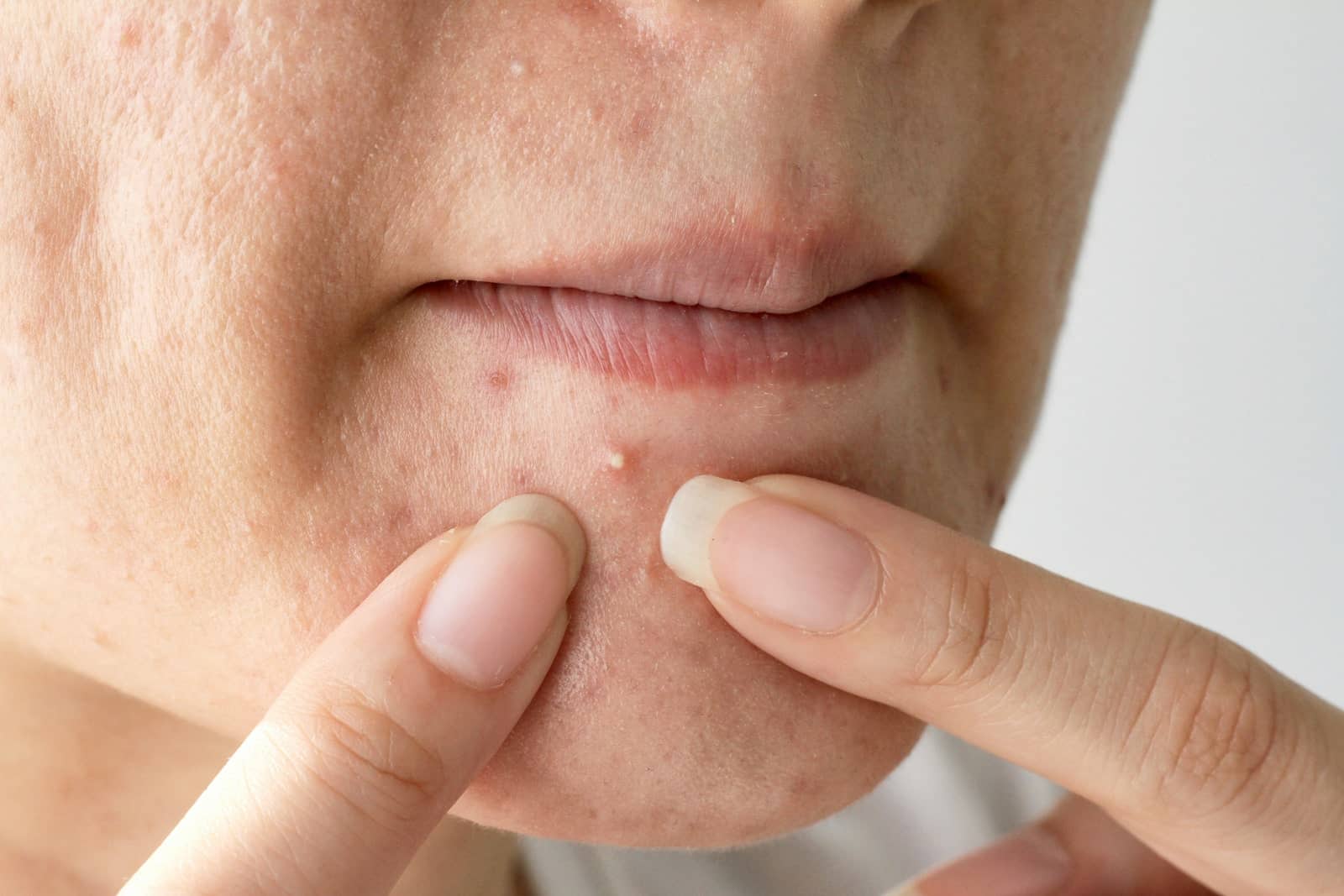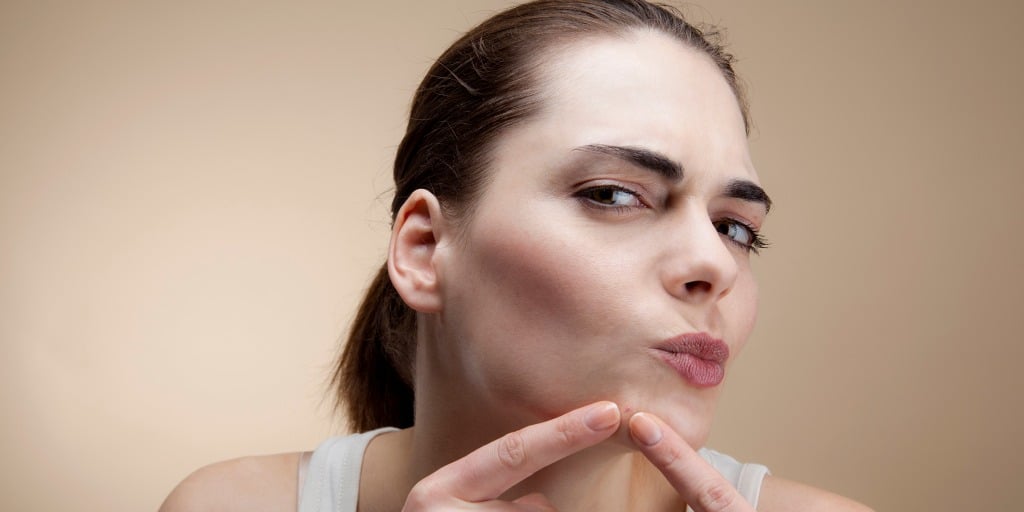
There are mixed feelings about popping pimples. Some find it extremely satisfying to remove pimples, while others find it repulsive. Yes, popping a pimple or big blackhead is tempting, but any dermatologist will tell us that tightening the skin is a bad idea.
The problem is that popping will not eliminate the problem of pimples. In fact, face pinching can make things worse. Acne is an inflammatory skin disorder that occurs when the sebaceous glands become clogged with excess oil and dead skin cells, trapping bacteria in the pores. This process produces an inflammatory response, which results in the development of pus-containing pimples.
Pimples odors when exploding
We may not have noticed if we only get a few pimples on an occasional basis. But the truth is that when a pimple is squeezed and we release the pus (a mixture of bacteria, blood, and debris), an unpleasant or strange odor can sometimes be emitted. This odor is simply the byproduct of bacteria feeding on oil from the skin.
And while the occasional stinky stain isn't uncommon or cause for alarm, some scents, like the ones discussed below, can signal more serious skin issues if they occur frequently.
Cheese smell
If we have acne that smells like cheese, it is probably due to a epidermoid cyst, a non-cancerous growth under the skin. Skin is made up of a thin layer of cells that the body sheds. An epidermoid cyst forms when these cells move deeper into the skin and multiply instead of sloughing off. Epidermoid cysts can also develop due to injury or irritation.
These cysts usually have a thick yellow substance made up of the protein keratin, which is secreted by epidermal cells. And sometimes this fluid comes out of the cyst and will give off a cheesy smell.
While epidermoid cysts are generally harmless and painless, they can become inflamed or infected, and in rare cases, can lead to skin cancer. If the cyst becomes red, swollen, or tender, we should see a dermatologist, who may choose to treat it with anti-inflammatory injections, drain the cyst, or remove it entirely.
Rotten egg smell
Sulphur-smelling pus may be a sign of acne conglobata, a rare form of nodulocystic acne that occurs when large, painful cysts plug deep under the skin. Acne conglobata is a serious skin condition, which can also cause visible and disfiguring scars.
The first sign of acne conglobata is multiple inflamed nodules, which are filled with pus that may have a foul odor, like rotten eggs. To treat this type of severe acne, we must consult a dermatologist. A doctor may prescribe retinoids, steroids, or antibiotics to help control symptoms.
Smell of onion or garlic
If a pimple exudes an onion or garlic aroma, we can blame bacteria. The pimples are filled with pus, which is essentially dead white blood cells that provide a feast for infesting bacteria. These bacteria are mostly anaerobic (meaning they don't need oxygen to survive) and generate their own sulfur compounds as they grow.
That is why when we exploit a granite infested with this type of anaerobic bacteria, we can notice a smell of garlic or onion, whose characteristic essence (and flavor) comes from the presence of compounds that contain sulfur.
Although not uncommon, if the odor from the pores persists, we might go to the dermatologist to discuss acne treatments.

Consequences of popping them
Any dermatologist recommends that pimples not be popped. Not only will we increase the chances of leaving marks on the skin, but they also pose a danger to skin infections.
Redness and swelling
Popping, picking, and handling a pimple can irritate it and cause it to rupture under the skin. This often triggers an inflammatory response, leading to more redness and swelling.
In other words, breaking up the blemish can make it bigger and can lengthen the time it takes for the lesion to clear up. That is, the opposite of what we want. And, although it bothers us to see the head of the whitish pimple, it is usually better than having red and inflamed skin.
get an infection
Popping a pimple can cause trauma to the skin, which can create an entrance for bad bacteria. Once the bacteria get through the broken skin portal, they can worsen the inflammation or start an infection. Although less common, in severe cases, this can even lead to an abscess (a painful pocket of pus) or cellulitis (a bacterial skin infection that causes a red, swollen rash that is warm to the touch).
In fact, if left untreated, a cellulitis infection can travel to the lymph nodes and bloodstream, which can be life-threatening and require immediate medical attention. However, when talking about the common pimples on the face, we should not be alarmed in this type of infection.
cause scars
The whole premise behind popping a pimple is to make it go away faster. But ironically, picking at the pustule can leave a lasting mark. Popping a pimple worsens inflammation and increases the likelihood of acne scarring.
Inflammation can break down collagen and lead to increased pigment production in the skin. This process produces atrophic acne scars and post-inflammatory hyperpigmentation (darkened patches or spots on the skin). Also, if we sunbathe with popped pimples, it is common for spots to remain.
Alternatives to not exploit them
There are certain types of blemishes that we should never try to pop. They include boils, cystic acne, and pimples that lie below the skin's surface. If we can't see a visible pimple or blackhead in a pimple, we probably won't be able to pop it anyway.
In trying to pop a pimple that isn't ready to break open, we risk exposing the inner layers of the skin to bacteria and other irritants. This can cause the pimple to take longer to heal, resulting in other pimples and even permanent scarring on the face.
Test the topics
To avoid unwanted side effects, it is best to eliminate the appearance of pimples. We can think about trying acne medications and topicals that will help prevent and treat the problem with pimples. The topics that contain benzoyl peroxide and salicylic acid they can help calm inflammation and reduce acne lesions.
And if it's hard to resist touching a pustule, we can use a pimple patch instead of touching it with our hands. It is recommended to start with a product that has a low concentration of benzoyl peroxide as an active ingredient.
go to a dermatologist
If pimples are a persistent problem, we should see a board-certified dermatologist so that they can assess the skin condition. In addition to prescribing acne-fighting medications, dermatologists may also employ some strategies to safely pop a pimple, such as the following techniques:
- Extraction: The doctor uses sterile instruments to remove blackheads and whiteheads.
- Corticosteroids: The doctor injects a pimple with a corticosteroid, which speeds the healing process of acne, deep painful cysts or nodules, and reduces the risk of scarring.
- incision and drainage: A doctor uses a sterile needle or surgical blade to cut open a pimple, cyst, or nodule and empty out the contents.
But if we insist on popping pimples at home, dermatologists advise against doing so as there is a safer way to do it if we just can't resist the urge.

How to pop a pimple?
The surest way to get rid of a pimple is to wait for it to pass. Blackheads surround bacteria that get trapped in the layers of the skin. Popping a pimple releases those bacteria onto your face. The skin knows how to heal a pimple better than we do. If we are going to pop a pimple, it is recommended to follow some guidelines that will be safer for the skin.
- Wash hands. Always sanitize with soap and water before touching the skin. This will reduce the chances of dirt, debris, or bacteria getting into the skin and causing an infection. If we're using a comedone extractor, a hand tool with a hollow circle on the end that's specifically designed to remove blackheads and whiteheads, we need to make sure to sterilize the instrument as well.
- Apply a warm compress (or take a hot shower) before. This helps soften and prepare the skin for extraction.
- the use of a clean tissue paper It is important to gently press the skin around the pimple. We should never use our nails to squeeze. This can inadvertently scratch the surface of the skin, creating a convenient entrance for infection-causing bacteria.
- Don't apply too much pressure. If we are trying to pop a pimple, but do it with light pressure, we are most likely going too deep and not being aggressive. Strong pressure will contribute to increased inflammation and redness.
- Apply a drop of a topical antibiotic cream. This will help prevent infection in the area.